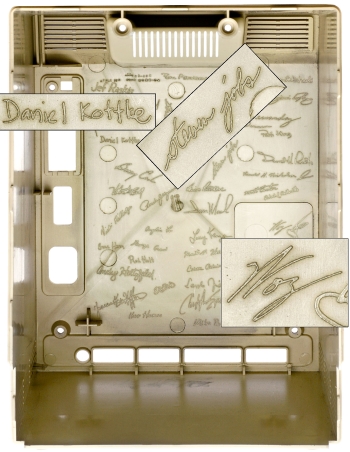 When Apple founder Steve Jobs and the team that developed the Macintosh computer completed the final design, they signed it. Inside every Macintosh that shipped in 1984 are the signatures of each of the 46 members of the team. As Jobs explained to them, “Real artists sign their work.”
When Apple founder Steve Jobs and the team that developed the Macintosh computer completed the final design, they signed it. Inside every Macintosh that shipped in 1984 are the signatures of each of the 46 members of the team. As Jobs explained to them, “Real artists sign their work.”
St. Augustine said something similar to his catechists. He said catechesis is an art. The script is the Scriptures and the actors are the catechists, the catechumens, and the parish community.
Art changes people
As an artist, a catechist has to be careful. Augustine cautioned that some people would rather cheer than change. That is, the art of catechesis is not about how well you teach. It is about how effective you are at fostering conversion. Our artistry is a gift from God, and its measure is how well the faith is embodied, how lavishly charity is bestowed, and how consistently justice is enacted.
We cannot rely completely on giftedness, however. All artists, no matter how talented, must practice their art. Augustine might have said that if you are not willing to put in the hours of practice it takes to be a true artist, you may not have a vocation for catechesis. How many times does a gymnast need to train for her routine? How often must a pianist practice his repertoire? How diligently must a stage actor rehearse a Shakespearean soliloquy? If you have ever said about an outstanding performance, “He makes it look easy,” you can bet there is a huge amount of work behind making the difficult look effortless.
Performance art is ephemeral
There is another important element about the art of catechesis that we have to remember. It only exists in the moment. You can’t sign your name to your catechesis as did the Mac team. You don’t have a physical product to show once you have finished. As catechists, we are performance artists. That means we will not be remembered for our art. Of all the people who have played Mozart over the centuries, it is unlikely that Mozart himself was the very best performer of his music. We remember Mozart because of his skill as a composer, not as a performer. Who was the Mozart best performer? We don’t know. We can’t know. Performance art only exists in the moment.
What this means is, we can never find the ultimate teaching tool that will train us as catechists. A great catechist can write down what he does and how he does it (as Augustine and many others have done), but they can never fully convey in the printed word what is meant to be performed. Augustine’s solution to this was to offer apprenticeships to those who wished to be trained as catechists. Augustine didn’t have much use for books about how to catechize (even though he wrote one). He believed good catechists needed raw talent, lots of practice, and good role models.
Scholarship is a safeguard, not a training
That’s not to say Augustine didn’t believe in rigorous study for catechists. He would be the first to tell his catechists that they needed to be scholars. But their scholarship was a safeguard against their talent getting them off track and into ideas that were not fully consistent with Christian teaching. Scholarly study was not, all by itself, a training for the art of catechesis.
Would you sign your work?
As catechists, we have to ask ourselves, do we take our art seriously? Do we practice our art with a regular discipline? Do we measure the effectiveness of our art by the quality of conversion that happens in the seekers and catechumens?
If we could, would we sign our names to our catechetical performances because real artists sign their work?
For more about what Augustine said about RCIA catechesis as performance art, see Augustine and the Catechumenate by William Harmless, Presence 249-350.









Nice post Nick! I completely agree. It really is an art to be engaging and informative at the same time. Kind of like performance art. And, scholarly learning is most definitely not the only component to effective catechesis. I love that book on Augustine by William Harmless too!
“You don’t have a physical product to show once you have finished.”????
Disciples on fire for Jesus Christ???
Just a few remembered for their art; St Peter, St Paul, (all the apostles), St Ignatius, St Justin, St Chrysostom, St Augustine, St Jerome, St Francis, St Thomas, St Francis Xavier, Thomas a Kempis, St Thomas More, St Junipero Serra, North American martyrs, Fr De Smet, St Francis de Sales, St Alphonsus Liguori, Frederick Faber, John Henry Newman, St Therese of Lisieux, GK Chesterton, Marie Joseph Lagrange, St Maximilian Kolbe, Edith Stein, Edward Leen, Ronald Knox, Romano Guardini, Francois Mauriac, Jacques Maritain, Arnold Lunn, Fulton Sheen, Frank Sheed, and many many more.
I agree that Art changes people BUT I am reminded that Michelangelo after carving his name on La Pieta` regretted it as he realised it was done in vanity. He acknowledged that his talents were a God given gift and only the Almighty should be glorified. I do not agree with Jobs that “Real artists sign their work” ! However, I do I agree with St Augustine, catechists sharing their time on a voluntary basis are the real artists!